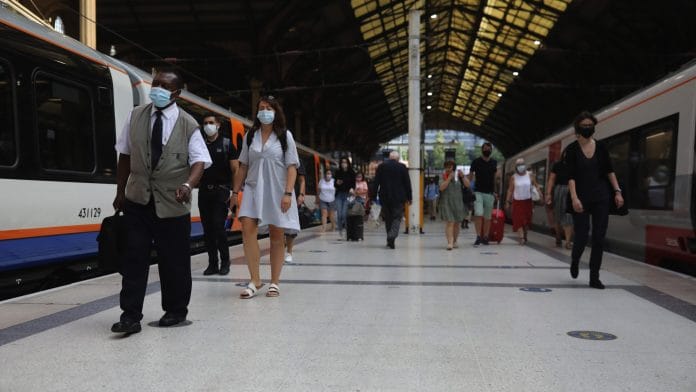The New Year in Britain begins with a new national lockdown, but Boris Johnson has promised things will get better soon. He has said he will vaccinate 13.9 million of the country’s most vulnerable citizens by mid-February so that schools can reopen and the hardest restrictions can be eased.
Taking such pledges at face value requires a suspension of disbelief in the U.K.’s case. No Western country has done particularly well during the pandemic, but Britain’s higher death toll and deeper economic malaise reflects a long string of missed targets and policy errors. Just this week the government shut schools less than a day after Johnson said they would stay open and weeks after government scientific advisors made clear that the previous restrictions wouldn’t stem the exponential growth of the virus’s new variant.
Still, a record of mishaps doesn’t mean the prime minister is wrong to set an ambitious vaccination goal. On the contrary, it would be a failure of leadership not to. The speed of Britain’s vaccine rollout will directly correlate with lives saved and also the rate at which the economy can recover. And yet, it’s not enough to declare a lofty target — the plan for meeting it must be viable.
At the current pace, the U.K.’s first-phase vaccinations of the most vulnerable wouldn’t be complete until late next year. To hit Johnson’s mid-February target, the government will have to ramp up vaccinations from about 300,000 a week to 2 million a week. That will be challenging, though not impossible.
The U.K. has had a head start in part because it was the first to approve a Covid vaccine, the Pfizer-BioNTech shot, and in part because most of the 100 million doses of the more easily transported Oxford-AstraZeneca vaccine will be manufactured domestically. Both of the vaccines’ makers say deliveries are on track, with AstraZeneca promising an additional two million doses by the third week of January.
So where are the bottlenecks? Only 1.3 million vaccinations have been done so far, even though the Financial Times has reported that more than 4 million doses of the BioNTech/Pfizer vaccine was delivered before the end of 2020. One problem is that particular vaccine requires complicated cold storage, which can hamper distribution.
Another reported holdup is what’s called the “fill and finish” — the part of the process in which vials are filled with the vaccine and packaged for distribution. There have been concerns about supply shortages of glass vials and that seems to have slowed down the number of available doses.
There’s also the certification process, whereby each batch of the vaccine has to be checked and certified by the U.K.’s medicines regulator. The prime minister suggested that batch testing and certification was a “rate-limiting factor.”
The biggest limiting factor, however, is one more directly within the government’s control. While the supply needs to flow fast, it is the distribution and management of the actual shots that will probably make the difference between a historic success and yet another missed target.
As a timely new report by the Adam Smith Institute sets out, Johnson could hit a much higher weekly vaccination number if it was willing to depart from the over-centralization that characterizes British government — and which has frustrated other pandemic policies — and look for more innovative solutions. This demands not simply the prime minister’s “we can do it” optimism but also a wartime-type effort to accelerate the program.
In this, the U.K. could learn something from Israel, which also had serial lockdowns and major pandemic management problems, but has become the world leader in the vaccine rollout. Israel’s government moved at speed to secure the shots and distribution was highly responsive, with mobile vaccination units open all hours and coordinated by Israel’s efficient health-insurance organizations. The opposition Labour Party leader Keir Starmer has called for “round the clock” shots in Britain, while the Adam Smith Institute report says the country should be aiming for 6 million jabs a week (noting that Israel is vaccinating at 10 times the U.K. rate).
The U.K. has resources it hasn’t yet tapped for the vaccine rollout. The military has assisted effectively with almost every stage of the pandemic and could play a role in the logistics effort here. A bigger game changer would be to allow pharmacies to act as extra vaccination centers, as the Royal Pharmaceutical Society has called for. That’s hardly a stretch given that many already dispense flu and travel vaccines.
Johnson could go much further and set up 24/7 vaccination centers — as suggested by Starmer — and use closed hospitality venues, online bookings and drop-in appointments to send the message that Britain will vaccinate as quickly as it receives supplies. Reports that there will be no vaccines delivered on Sundays sends the opposite message.
The good news is that, unlike in France, vaccine take-up in Britain is strong. But the past year has demonstrated all the ways ambitious targets mean little without an effective implementation strategy. Johnson’s government needs to demonstrate that it will do whatever it takes to get shots into arms. If ever there was a case for saying “run, don’t walk” toward the exit, this is it. – Bloomberg
Also read: With Christmas cancelled, Boris Johnson has once again found himself behind the Covid curve






